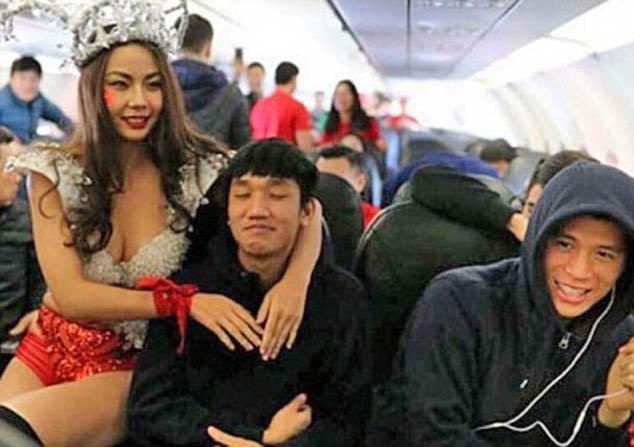Social Media, Self and Society- Vietjet Air: It's time to change your 'notorious' reputa
- Loi Dao
- Jun 2, 2018
- 5 min read
In this era of digital transformations, businesses should stay abreast of the opportunities and challenges posed by all multifaceted trends (Flew, 2014). Particularly, the trend of media convergence has given rise to many social media platforms utilised by businesses for them to be more competitive in the market (Jenkins, 2004). Businesses in Vietnam have not failed to adopt social media campaigns for promotion. However, some businesses have mismanaged their social media platforms, which exerts a negative impact on their brand. This essay will critically analyse a social media ‘fail’ of Vietjet Air by examining and identifying key factors contributing to that mismanagement, and then provide some recommendations for them to improve their social media strategies.
Vietjet Air, an international budget airline from Vietnam, was the first privately owned airline to be granted its operation in 2011. Vietjet Air constituted for a 42% and 27% share of the Vietnamese domestic market and the total market respectively in 2016 (CAPA, 2017). Constantly proving reputation as one of the largest airlines in Vietnam, Vietjet Air projects to earn approximately US$2.24 billion in revenue in 2018 (VOA, 2018).
Impressive as their sales are, in general, Vietjet Air has a history of poor social media presence. Compared to their capacity to carry 17.11 million passengers on board over 98,800 flights in 2017 (VOV, 2018), there are just approximately 8,000 likes and follows on their Facebook, as shown in Figure 1 (as of June 1st, 2018). Moreover, the engagement is low with an average of 3-4 likes per post, and the comment section is mostly left blank, as shown in Figure 2.

Figure 1. Vietjet Air's Facebook

Figure 2. Vietjet Air's low engagement on their Facebook
Especially, in terms of the reviews that are written by their audience on their Facebook, it can be seen that most of the reviews show their dissatisfaction in the management of their business, which included several flight delays without any official announcements and apologies (Figure 3). Not only domestic customers review badly of Vietjet Air but also many foreign customers express their discontentment as well. Apart from Facebook, they have a poor presence on their Linkedin with a limited number of followers. Especially, they have no other social media platforms to engage more audience.

Figure 3. Reviews on Vietjet Air's Facebook
The epitome of social media ‘fail’ by Vietjet Air can be clearly illustrated in the case of a bikini stunt performed on board in early 2018. In order to ‘reward’ the U-23 Vietnamese national football team’s achievement of a silver medal in a regional football championship, Vietjet Air decided to grace them with a bikini-clad cabin during the flight back home to Vietnam from China (Tomiyama, 2018). This parade underwent public rage on social media after photos and videos were leaked online, including a capture of a footballer looking uncomfortable in arms of a woman in a low-cut top (Figure 4).

Figure 4. A footballer looking uncomfortable in arms of a woman in a low-cut top (Birchall, 2018)
The spreadability of those photos and videos on Facebook were possible thanks to the "technical affordances" that were offered, as the audience could easily share by clicking buttons and discuss these content with many other Facebook users who were concerned about this incident (Green and Jenkins, 2011, p. 112). Due to the overwhelming negative response from their social media, Ms Nguyen, CEO of VietJet Air, made an official statement that the bikini parade was merely a “spontaneous act”, shifting the blame on “the urgency of the flight, the harsh weather and the complicated procedures in China” for the airline’s “mistakes” (Reed, 2018). Due to unreasonable explanations from the head of Vietjet Air, the responses from the public became even massively outrageous. The company accordingly shut down their Facebook for several days before all the rage were soothed (Dao, 2018). As suggested by this social media mismanagement, it can be concluded that Vietjet Air failed to address their social media crisis effectively.
Figure 4. Vietjet Air's official apology recap (TomoNews US, 2018)
There are some key factors contributing to the social media ‘fail’ of Vietjet Air. First, there is a lack of engagement in their Facebook and other social media platforms. In fact, the audience in this era of social media, rather than being seen as “passive recipients”, are now “co-creators” who enable a two-way flow of information (Serazio and Duffy, 2018, p. 481). Vietjet Air have failed to fully understand the significance of creating social network sites as platforms for people to gather and connect with more and more people, to begin with (Boyd, 2010) as there seems to be only one-way interaction on their Facebook and other social media platforms that they own currently. Especially, considering that their main stakeholders are the young “digital natives” who actively use social media, they are unable to create an effective participatory culture among their audience to engage and interact with others (Jenkins, 2012). Second, they have poor crisis management for their social media scandal. When a crisis on social media occurs, businesses should acknowledge their wrongdoing first and respond to the backlash in a consistent way, individually or collectively depending on the situation (Cassidy, 2018a). Vietjet Air’s statement after their scandal should have been stated explicitly their apologies by acknowledging what they had done wrong. However, they held unreasonable aspects responsible for their absurd bikini-clad parade to welcome the national football team. Furthermore, after receiving harsh criticism from the public, they deactivated their Facebook for several days and even deleted their post, which could be seen as a “worst” reaction in any social media crisis (Cassidy, 2018a). By doing so, Vietjet Air triggered even worse responses from the public, who were already disappointed by their bikini parade incident.
So as to run a more effective social media campaign, I would recommend Vietjet Air to adopt these two strategies. First, they should make full advantage of a social media content calendar and use corporate analytic tools for their social media platforms in order to create and curate a stronger presence online. In a professional setting for businesses, such a presence can be generated based on the area of expertise and association with other professionals in the same field (Cassidy, 2018b). In order to do so, Vietjet Air should create a social media calendar. A social media calendar, combining both created content and curated content, is a time-efficient tool to plan ahead every post on their social media platforms. Besides utilising a social media calendar, Vietjet Air can be more flexible in promoting by including posting some sneak-peak events before any major announcements, offering exclusive discount codes, and other talent contests to encourage more participation (Cassidy, 2018a). Furthermore, to manage the effectiveness of their social media activities, Vietjet Air should also implement the use of social media analytics, such as Klear and Keyhole suggested by Cassidy (2018b). Second, Vietjet Air should develop a crisis management plan in advance. The two main concerns should be addressed in the time of crisis are what may happen in the crisis and how to tackle with a huge amount of complaints (Cassidy, 2018b). The apology statement should answer what makes the public concerned and offer some future actions so as not to repete the same mistakes. A crisis FAQ template and response framework should be in consideration as it can help reduce the number of questions that they might have to deal with individually.
In conclusion, this essay has critically analysed the social media ‘fail’ of Vietjet Air, as illustrated by their whole social media presence and their particular ‘bikini-clad’ cabin scandal and provide some recommendations in order to improve Vietjet Air’s social media presence. In the future, if Vietjet Air implements more effective social media strategies, I believe that they can overcome their notorious reputation of being a 'bikini airlines' with poor social media presence.






















Comments